Deck 24: Electrophilic Aromatic Substitution 1: Substitution on Benzene; Useful Accompanying Reactions
Question
Question
Question
Question
Question
Question
Question
Question
Question
Question
Question
Question
Question
Question
Question
Question
Question
Question
Question
Question
Question
Question
Question
Question
Question
Question
Question
Question
Question
Question
Question
Question
Question
Question
Question
Question
Question
Question
Question
Question
Question
Question
Question
Question
Question
Question
Question
Question
Question
Question

Unlock Deck
Sign up to unlock the cards in this deck!
Unlock Deck
Unlock Deck
1/50
Play
Full screen (f)
Deck 24: Electrophilic Aromatic Substitution 1: Substitution on Benzene; Useful Accompanying Reactions
1
What is the expected product for the following reaction? 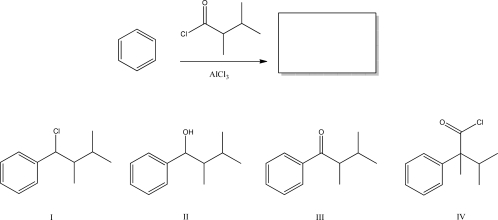
A)I
B)II
C)III
D)IV
E)None of these will be produced.

A)I
B)II
C)III
D)IV
E)None of these will be produced.
III
2
Which mechanism step is not found in the nitration of benzene?
A)Coordination
B)Heterolysis
C)Electrophilic addition
D)Electrophile elimination
E)Proton transfer
A)Coordination
B)Heterolysis
C)Electrophilic addition
D)Electrophile elimination
E)Proton transfer
Coordination
3
Which of the following is not true of Friedel-Crafts acylation reactions?
A)They require an AlCl3 catalyst.
B)They proceed through an acylium ion intermediate.
C)They are susceptible to carbocation rearrangements.
D)They require an acid halide as a starting material.
E)They create aromatic ketones.
A)They require an AlCl3 catalyst.
B)They proceed through an acylium ion intermediate.
C)They are susceptible to carbocation rearrangements.
D)They require an acid halide as a starting material.
E)They create aromatic ketones.
They are susceptible to carbocation rearrangements.
4
Which of the following is true regarding sulfonation?
A)Sulfonation can be used as a protecting group.
B)Sulfonation requires the nucleophilic addition of SO3.
C)Sulfonation slows down with the addition of fuming sulfuric acid.
D)Sulfonation is irreversible.
E)Sulfonation requires nucleophile elimination in its mechanism.
A)Sulfonation can be used as a protecting group.
B)Sulfonation requires the nucleophilic addition of SO3.
C)Sulfonation slows down with the addition of fuming sulfuric acid.
D)Sulfonation is irreversible.
E)Sulfonation requires nucleophile elimination in its mechanism.

Unlock Deck
Unlock for access to all 50 flashcards in this deck.
Unlock Deck
k this deck
5
Which reagent(s)will complete the following reaction? 

A)I
B)II
C)III
D)IV
E)V


A)I
B)II
C)III
D)IV
E)V

Unlock Deck
Unlock for access to all 50 flashcards in this deck.
Unlock Deck
k this deck
6
What is the starting material that best completes the following reaction? 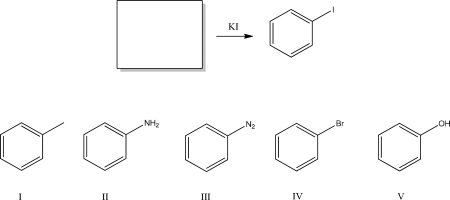
A)I
B)II
C)III
D)IV
E)V

A)I
B)II
C)III
D)IV
E)V

Unlock Deck
Unlock for access to all 50 flashcards in this deck.
Unlock Deck
k this deck
7
Which reagent(s)will best complete the following reaction? 
A)Cl2
B)NaCl
C)HCl
D)Cl2, FeCl3
E)AlCl3

A)Cl2
B)NaCl
C)HCl
D)Cl2, FeCl3
E)AlCl3

Unlock Deck
Unlock for access to all 50 flashcards in this deck.
Unlock Deck
k this deck
8
What is the product of the following reaction? 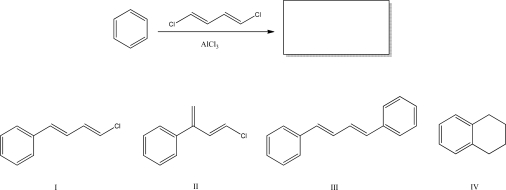
A)I
B)II
C)III
D)IV
E)No reaction will occur.

A)I
B)II
C)III
D)IV
E)No reaction will occur.

Unlock Deck
Unlock for access to all 50 flashcards in this deck.
Unlock Deck
k this deck
9
What is the most likely product of the following reaction? 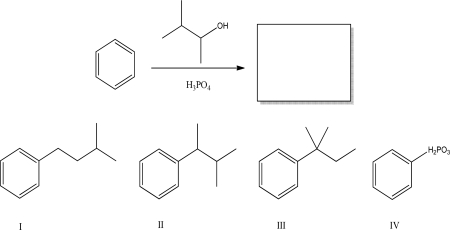
A)I
B)II
C)III
D)IV
E)None of these

A)I
B)II
C)III
D)IV
E)None of these

Unlock Deck
Unlock for access to all 50 flashcards in this deck.
Unlock Deck
k this deck
10
What is the product of the following reaction? 

A)I
B)II
C)III
D)IV
E)None of these is the product.


A)I
B)II
C)III
D)IV
E)None of these is the product.

Unlock Deck
Unlock for access to all 50 flashcards in this deck.
Unlock Deck
k this deck
11
Which reagent(s)will best complete the following reaction? 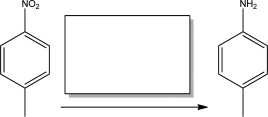

A)I
B)II
C)III
D)IV
E)V


A)I
B)II
C)III
D)IV
E)V

Unlock Deck
Unlock for access to all 50 flashcards in this deck.
Unlock Deck
k this deck
12
Which of the following mechanism steps would be included in the following general mechanism? 
A)Nucleophilic addition
B)Nucleophile elimination
C)SN2
D)Electrophilic addition
E)Carbocation rearrangement

A)Nucleophilic addition
B)Nucleophile elimination
C)SN2
D)Electrophilic addition
E)Carbocation rearrangement

Unlock Deck
Unlock for access to all 50 flashcards in this deck.
Unlock Deck
k this deck
13
What is the most likely product of the following reaction? 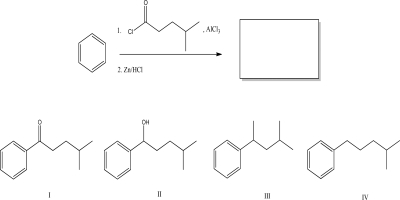
A)I
B)II
C)III
D)IV
E)No reaction will occur.

A)I
B)II
C)III
D)IV
E)No reaction will occur.

Unlock Deck
Unlock for access to all 50 flashcards in this deck.
Unlock Deck
k this deck
14
Which reagent(s)will complete the following reaction? 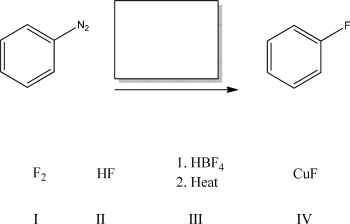
A)I
B)II
C)III
D)IV
E)Both II and IV will work.

A)I
B)II
C)III
D)IV
E)Both II and IV will work.

Unlock Deck
Unlock for access to all 50 flashcards in this deck.
Unlock Deck
k this deck
15
Which reagent(s)will best complete the following reaction? 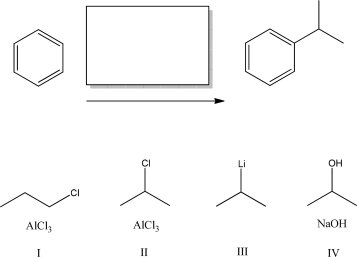
A)I
B)II
C)III
D)IV
E)Both I and II will complete the reaction.

A)I
B)II
C)III
D)IV
E)Both I and II will complete the reaction.

Unlock Deck
Unlock for access to all 50 flashcards in this deck.
Unlock Deck
k this deck
16
What reagent(s)will complete the following reaction? 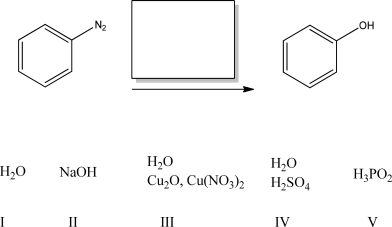
A)I
B)II
C)III
D)IV
E)V

A)I
B)II
C)III
D)IV
E)V

Unlock Deck
Unlock for access to all 50 flashcards in this deck.
Unlock Deck
k this deck
17
Which of the following is not included in the mechanism for the following reaction? 
A)Coordination
B)Electrophilic addition
C)Electrophile elimination
D)Nucleophile elimination
E)1,2-hydride shift

A)Coordination
B)Electrophilic addition
C)Electrophile elimination
D)Nucleophile elimination
E)1,2-hydride shift

Unlock Deck
Unlock for access to all 50 flashcards in this deck.
Unlock Deck
k this deck
18
Which reagent(s)will best complete the following reaction? 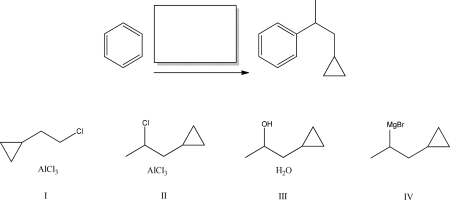
A)I
B)II
C)III
D)IV
E)Both I and II will complete the reaction.

A)I
B)II
C)III
D)IV
E)Both I and II will complete the reaction.

Unlock Deck
Unlock for access to all 50 flashcards in this deck.
Unlock Deck
k this deck
19
What is the most likely product of the following reaction? 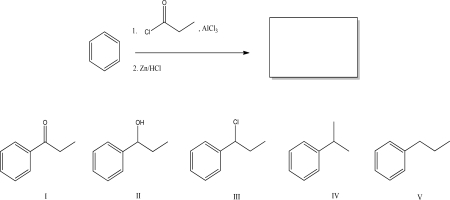
A)I
B)II
C)III
D)IV
E)V

A)I
B)II
C)III
D)IV
E)V

Unlock Deck
Unlock for access to all 50 flashcards in this deck.
Unlock Deck
k this deck
20
What is the product of the following reaction? 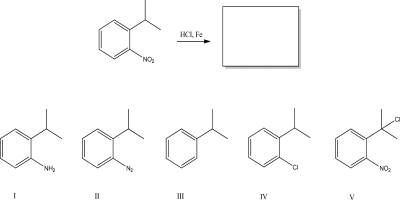
A)I
B)II
C)III
D)IV
E)V

A)I
B)II
C)III
D)IV
E)V

Unlock Deck
Unlock for access to all 50 flashcards in this deck.
Unlock Deck
k this deck
21
Starting with the following,give the general mechanism for electrophilic addition. 


Unlock Deck
Unlock for access to all 50 flashcards in this deck.
Unlock Deck
k this deck
22
Which reagent(s)will best convert benzene into methyl benzoate? 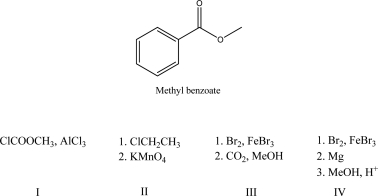
A)I
B)II
C)III
D)IV
E)None of these will convert benzene to methyl benzoate.

A)I
B)II
C)III
D)IV
E)None of these will convert benzene to methyl benzoate.

Unlock Deck
Unlock for access to all 50 flashcards in this deck.
Unlock Deck
k this deck
23
Give the product of the following reaction. 


Unlock Deck
Unlock for access to all 50 flashcards in this deck.
Unlock Deck
k this deck
24
Give the mechanism and product for the following reaction. 


Unlock Deck
Unlock for access to all 50 flashcards in this deck.
Unlock Deck
k this deck
25
What is the most likely product of the following reaction? 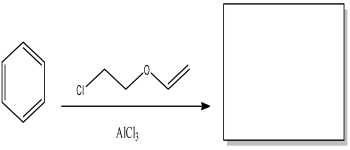


Unlock Deck
Unlock for access to all 50 flashcards in this deck.
Unlock Deck
k this deck
26
Indicate what types of mechanism steps are involved in the following reaction sequence. 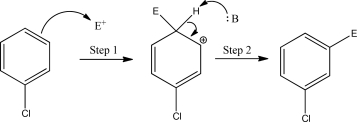


Unlock Deck
Unlock for access to all 50 flashcards in this deck.
Unlock Deck
k this deck
27
Identify the reagents that best complete the following reaction. 


Unlock Deck
Unlock for access to all 50 flashcards in this deck.
Unlock Deck
k this deck
28
Give the mechanism for the creation of nitrosonium ion from concentrated nitric acid.

Unlock Deck
Unlock for access to all 50 flashcards in this deck.
Unlock Deck
k this deck
29
What is the most likely product of the following set of reactions? 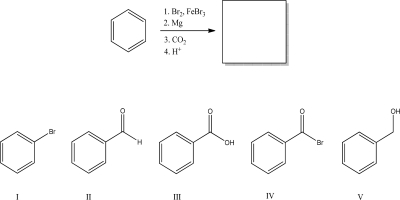
A)I
B)II
C)III
D)IV
E)V

A)I
B)II
C)III
D)IV
E)V

Unlock Deck
Unlock for access to all 50 flashcards in this deck.
Unlock Deck
k this deck
30
Show how the following molecule can be synthesized from benzene. 


Unlock Deck
Unlock for access to all 50 flashcards in this deck.
Unlock Deck
k this deck
31
What is the most likely product of the following reaction? 


Unlock Deck
Unlock for access to all 50 flashcards in this deck.
Unlock Deck
k this deck
32
What is the most likely product of the following reaction? 


Unlock Deck
Unlock for access to all 50 flashcards in this deck.
Unlock Deck
k this deck
33
What is the most likely product of the following reaction? 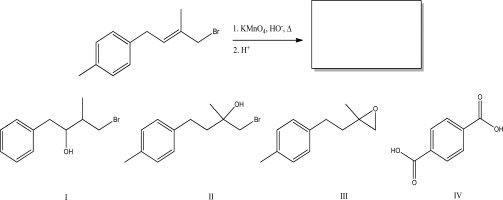
A)I
B)II
C)III
D)IV
E)No reaction will occur.

A)I
B)II
C)III
D)IV
E)No reaction will occur.

Unlock Deck
Unlock for access to all 50 flashcards in this deck.
Unlock Deck
k this deck
34
What is the most likely product of the following reaction? 


Unlock Deck
Unlock for access to all 50 flashcards in this deck.
Unlock Deck
k this deck
35
Show how the following molecule can be synthesized from benzene. 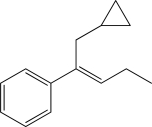


Unlock Deck
Unlock for access to all 50 flashcards in this deck.
Unlock Deck
k this deck
36
Which of the following starting materials will not produce benzoic acid when treated with hot KMnO4? 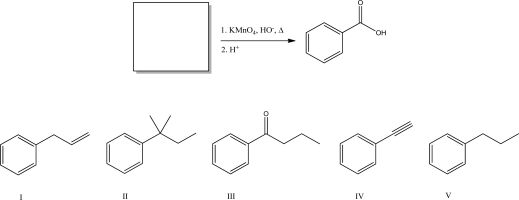
A)I
B)II
C)III
D)IV
E)V

A)I
B)II
C)III
D)IV
E)V

Unlock Deck
Unlock for access to all 50 flashcards in this deck.
Unlock Deck
k this deck
37
Give the product of the following reaction. 


Unlock Deck
Unlock for access to all 50 flashcards in this deck.
Unlock Deck
k this deck
38
Explain why the following reaction does not occur. 


Unlock Deck
Unlock for access to all 50 flashcards in this deck.
Unlock Deck
k this deck
39
What reagents are required to complete the following reaction? 
A)I
B)II
C)III
D)IV
E)V

A)I
B)II
C)III
D)IV
E)V

Unlock Deck
Unlock for access to all 50 flashcards in this deck.
Unlock Deck
k this deck
40
Identify the reagents that best complete the following reaction. 


Unlock Deck
Unlock for access to all 50 flashcards in this deck.
Unlock Deck
k this deck
41
Show how the following compound can be synthesized from benzene. 


Unlock Deck
Unlock for access to all 50 flashcards in this deck.
Unlock Deck
k this deck
42
Show how aniline can be converted to benzene.

Unlock Deck
Unlock for access to all 50 flashcards in this deck.
Unlock Deck
k this deck
43
Show how the following compound can be synthesized from benzene. 


Unlock Deck
Unlock for access to all 50 flashcards in this deck.
Unlock Deck
k this deck
44
What is the product of the following reaction? 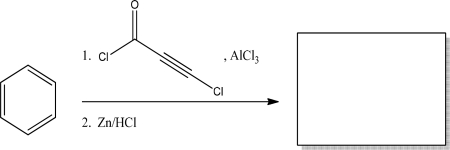


Unlock Deck
Unlock for access to all 50 flashcards in this deck.
Unlock Deck
k this deck
45
What is the product of the following set of reactions on benzene? 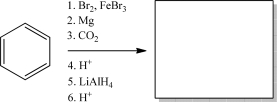


Unlock Deck
Unlock for access to all 50 flashcards in this deck.
Unlock Deck
k this deck
46
What starting material is required for the following synthesis? 


Unlock Deck
Unlock for access to all 50 flashcards in this deck.
Unlock Deck
k this deck
47
Show how phenol can be synthesized from nitrobenzene.

Unlock Deck
Unlock for access to all 50 flashcards in this deck.
Unlock Deck
k this deck
48
What is the product of the following reaction? 


Unlock Deck
Unlock for access to all 50 flashcards in this deck.
Unlock Deck
k this deck
49
What reagents best complete the following reaction? 


Unlock Deck
Unlock for access to all 50 flashcards in this deck.
Unlock Deck
k this deck
50
What is the product of the following reaction? 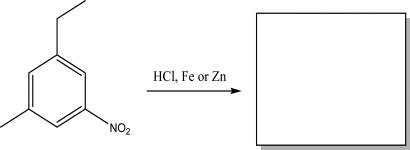


Unlock Deck
Unlock for access to all 50 flashcards in this deck.
Unlock Deck
k this deck


